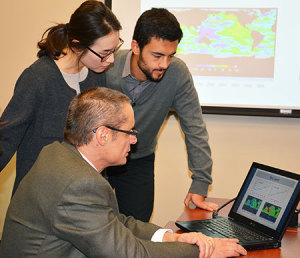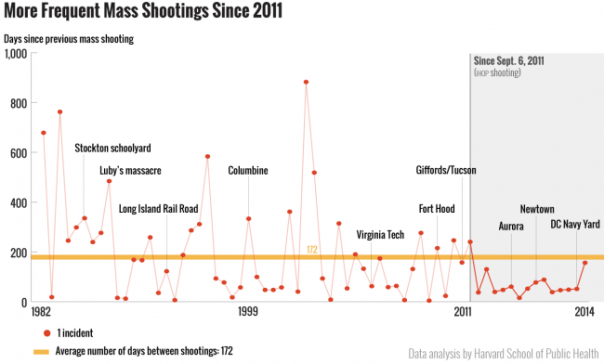Politicians who discredit global warming risk losing a big chunk of the female vote….women who consider the long-term consequences of their actions are more likely to adopt a liberal political orientation and take consumer and political steps to reduce global warming.
Jeff Joireman, associate professor of marketing at Washington State University, demonstrated that “future-oriented” women are the voting bloc most strongly motivated to invest money, time and taxes toward reducing global warming.
…
Joireman said belief in global warming is positively linked to outdoor temperatures, so in light of recent record-breaking heat, people – especially future-oriented women – may have climate change on their minds during next week’s midterm elections.
September was the hottest on record in 135 years, and the National Oceanic and Atmospheric Administration projects 2014 will likely break the record for hottest year.
This year’s political contests are also heated, with environmental ads surging to record levels. More than 125,000 political spots cite energy, climate change and the environment – more than all other issues except health care and jobs – according to an analysis by Kantar Media/CMAG.
Motivating the wider populace to engage and take action on global warming, however, is an ongoing challenge, said Joireman.
“Decisions that affect global warming pose a dilemma between what is good for individuals in the ‘here and now’ versus what is good for society and the environment ‘in the distant future,’” he said.
“Unfortunately, it can take several decades for the lay public and lawmakers to realize there is a problem that needs fixing,” he said. “This is clearly the case with global warming, as the consequences of our current lifestyle are not likely to be fully realized for another 25 to 50 years.”
…Joireman investigated how the time element contributes to people’s willingness to address climate change.
For the study, he focused on the personality trait called “consideration of future consequences.”
Those who score high on the trait scale tend to be very worried about the future impacts of their actions, while those with lower scores are more concerned with immediate consequences.
… his team polled 299 U.S. residents, with an age range of 18-75. Forty-eight percent of the respondents were female and 80 percent were Caucasian.
Women scored higher than men on liberal political orientation, environmental values, belief in global warming and willingness to pay to reduce global warming when their concern with future consequences was high.
But it wasn’t a simple gender difference. Women scored lower than men on liberal political orientation and willingness to pay when their concern with future consequences was low.
Joireman said a specific chain of influences makes future-oriented women more likely to take action. First, they are more politically liberal.
Liberals are more likely to value the environment, which makes them more likely to believe in global warming, he said. All together, these effects lead to a willingness to pay more in goods, services and extra taxes to help mitigate climate change.
“Future-oriented women, for example, might be more willing to pay higher prices for fuel-efficient cars, alternative forms of transportation and energy-efficient appliances. They might also eat less meat – all to help lower greenhouse gas emissions,” he said.
The question for environmental advocates now, said Joireman, is to “figure out how to motivate all people to engage in behaviors that reduce global warming. To be effective, we will likely need to tailor persuasive messages to appeal to the consequences people value.
“If people are not worried about future consequences, we have to try to appeal to their more immediate concerns,” he said, “like encouraging them to buy a fuel-efficient vehicle so they can instantly start saving money on gas.”










































































